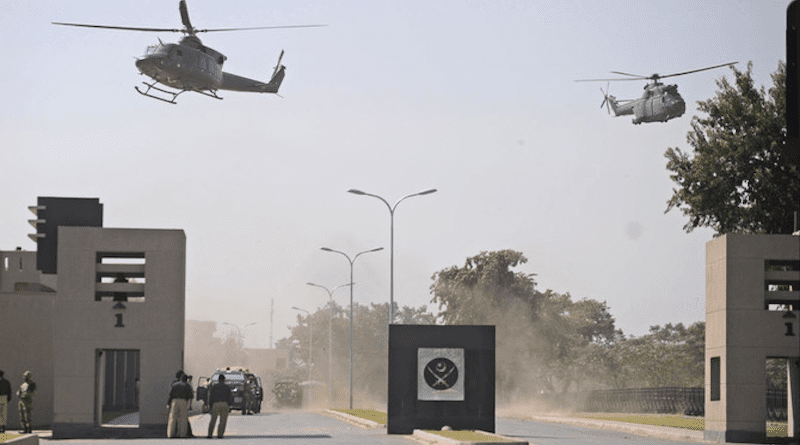Political Chaos In Pakistan – OpEd
By Sarah Saeed
May 9, 2023 was marked as a “Black Day” by National Security Committee in Pakistan as a mob attacked the army’s head office, General Headquarters (GHQ) in Rawalpindi. It was one of the many attacks that were launched on military installations and homes of Generals across the country which inflicted colossal damage to the nation’s pride. Pakistan’s political unrest is presently at a pivotal point where political leaders in their self-centered motivation are targeting security personnel and security installations across the country.
Political rivalry and criticism are normal features of a democratic society. However, the way recent violent and unprecedented attacks in Pakistan were carried out has a significant impact on public perception and the social security environment as a whole. Pakistan’s democratic institutions have been greatly impacted by Imran Khan’s aggressive politics and his struggle for power. His way of criticizing the opponentshas reduced public’sconfidence in the political system, and many people now believe that the government’s policies undermine democracy and the rule of law in the country. When politicians consistently launch hostile and divisive attacks against each other,it exacerbates social divisions. Political processes frequently suffer from a lack of credibility and trust when political leaders consistently target opponents.
One of the contributing elements to Pakistan’s current violent polarization can be found in Imran Khan’s relentless ideological attacks on his opponents. Divisions amongst many facets of Pakistani society have been practiced regularly as a key component of Imran Khan’s political strategy. He has frequently turned to demonize his political rivals, painting them as corrupt, ineligible to rule and Pakistan’s problem makers. IK’s strategy has been characterized by harsh rhetoric, personal assaults, which exacerbate existing social divides and religious high grounds exploited in a manner similar to the one employed during the infamous Islamic Revolution in Iran. The conversation becomes based on character assassination and personal assaults rather than policy disagreements and productive exchanges.
Imran Khan’s nationalistic appeals and claims of a purely Pakistani identity have been exploited to instill a sense of “us against them.” Therefore, when individuals firmly affiliate themselves with their leaders, they blindly follow their every single call and similarlypolarization intensifies, which further escalates the division. Imran Khan has accomplished this with his aggressive activities against the state entities quite well.His statements against Pakistan Army and military leadership have shaped public opinion against security forces, ringing alarm bells throughout the country.
Political leaders who have huge public support are expected to operate within the bounds of the constitution; on the other hand, only a criminal mind would introduce radical ideas and exhort his supporters to attack the state. The problem with Pakistan’s political supporters is that they rarely seek to investigate such things closely and end up acting as a convenient lure for political leaders. Imran Khan’s case is quite relatable as far as Pakistani politics goes.
Leaders are able to articulate their goals for the nation, participate in constructive disagreement, and seek to reach an agreement. By highlighting the shared interests and common aims that might bring the country together, this strategy can help to remove gaps and lessen polarization. But Imran Khan gradually revealed himself to be an unpredictable politician with a false sense of egoism who wished to keep everyone below his ego.Imran Khan in his political rivalry forgets that the military is the only shield protecting a nation from external threats because “if the military is not there, some other country’s military will be there”.When he came into power in 2018, he proved himself extremely unpredictable in his foreign policy approach in handling sensitive matters. Case in point, his use of the US diplomatic cypher card to trigger incitement against the US and leaking of diplomatic secrets in his political processions damaged Pakistan’s national interest and spoiled its foreign relations with countries.
The author is currently working with an Islamabad-based think tank. She writes on South Asian security issues and her articles are regularly published at different international forums.


So the military arrested 10,000 civilians?